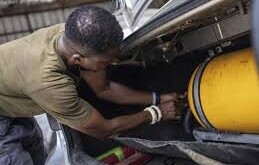The Federal Government’s initiative to shift Nigeria’s vehicle industry from petrol to gas has faced significant setbacks. Industry stakeholders report that initial enthusiasm has been dampened by shortages of gas and inadequate refilling infrastructure nationwide. Despite sufficient petrol supplies, gas scarcity is prompting users and investors to revert to petrol-powered vehicles. Many states lack active CNG schemes or have minimal activity, even where infrastructure exists. Although these challenges persist, the Presidential CNG Initiative and stakeholders confirm that the program continues, with efforts underway to address the issues and restore progress.
The Nigerian Federal Government has introduced incentives to promote the adoption of Compressed Natural Gas (CNG), including VAT removal on CNG equipment and infrastructure, and a directive from President Bola Tinubu for government agencies to acquire CNG vehicles. Additionally, the government pledged to fund the conversion of one million commercial vehicles to CNG, aiming to make public transportation cheaper.
However, investigations reveal that delays in approving licenses for new CNG stations have contributed to shortages at existing refilling points. Some users and industry insiders allege sabotage, suggesting vested interests in petrol importation are hindering the expansion of CNG infrastructure. Long queues at limited stations cause significant inconvenience, forcing many vehicle owners to revert to petrol due to time constraints and scarcity. Drivers report spending days waiting to refill, suffering financial and operational hardships, which undermines the government’s efforts to promote cleaner fuel alternatives.
The Abuja-Keffi Road, spanning about 38 kilometers and lined with over 49 petrol stations, has only one CNG station—located in Ado, Karu Local Government Area of Nasarawa State—which is currently non-functional after just eight months of operation. The only operational CNG station in Nasarawa State is in Lafia. Many motorists are frustrated, as they would have converted to CNG to save costs, but the lack of active refilling stations and conversion centers has hindered their plans.
In Abuja, only 11 CNG stations exist, with just three being reliable. This scarcity has forced many users, including taxi drivers and public servants, to revert to petrol due to long queues and the inability to access gas conveniently. Drivers report spending hours—sometimes up to eight—to refill, affecting their schedules and finances. The limited infrastructure and high demand mean many are abandoning CNG, undermining government efforts to promote cleaner fuel alternatives.
During a visit to several CNG stations in Lagos— including Ikeja, Mushin, and Apapa— no CNG was available, as attendants cited stock shortages and advised trying other stations or returning later. Sources close to NIPCO stations acknowledged the supply challenges, attributing them to delays at ports or shipment issues.
Additionally, it was reported that many government-approved outlets lack the necessary kits for vehicle conversion and refilling. Some outlets are selling their remaining stock of non-subsidized kits, but the consistent supply of equipment remains disrupted, complicating efforts to expand CNG usage in Lagos.
In the Southeast, progress on CNG adoption has been slow, nearly two years after the initiative’s launch. In Enugu State, the government has purchased 50 CNG buses, with an additional 50 expected soon; these buses are set to be operational before the month’s end. Plans include establishing an electric and CNG vehicle manufacturing plant in Enugu.
Ebonyi State has recently adopted the CNG initiative, purchasing some buses intended to serve civil servants and students, but has yet to begin services. Abia State, on the other hand, shows little interest in CNG buses, favoring plans to introduce electric buses by July and inviting investors into the CNG sector.
In contrast, Anambra State has seen private sector leadership through Innoson Vehicle Manufacturing, which launched CNG vehicle production in 2024 at its fully operational CNG conversion center. Despite this, local citizens and the government show little enthusiasm for CNG vehicles, with usage primarily by organizations like FRSC and outside entities. Another company is also preparing to produce CNG vehicles in Umunya.
In the South-South region, despite being Nigeria’s gas hub, the CNG initiative remains largely unimplemented. No CNG buses are present in Delta, Akwa-Ibom, Bayelsa, or Cross-Rivers, according to drivers, residents, and labor leaders. Officials from Bayelsa and Delta state confirm that the federal government’s CNG program has not taken off locally, with no reported CNG buses or active conversions.
Bayelsa labor leaders and residents expressed disappointment, noting that the policy has not benefited the state, and most vehicle owners are unfamiliar with CNG technology. Similarly, in Delta, people rely on petrol-powered vehicles, and there’s little evidence of CNG adoption. Although Delta state signed an MoU with NIPCO for a CNG conversion center, practical challenges like incompatible fuel stations hinder progress. Overall, the region remains largely unaffected by the federal CNG rollout.
In Warri, a commercial taxi operator expressed skepticism about the CNG rollout, noting that no conversion centers or CNG tricycles have been introduced, and fuel-powered Keke remain prevalent. Similarly, in Akwa-Ibom State, despite a high-profile launch last year, tangible progress has been lacking.
Governor Umo Eno announced plans to introduce CNG buses once refilling stations were established, emphasizing the importance of infrastructure before fleet deployment. Following this, in September, the federal government launched the P-CNGi in Uyo, signing an MoU with private partners to pilot CNG vehicle conversions.
Construction of a CNG mother station in Uquo Isi Edoho began in March 2025, but no services have started, and efforts to set up conversion facilities are still underway. Stakeholders remain uncertain about when the initiative will fully activate, as no official commissioning or operational CNG infrastructure exists to date.
